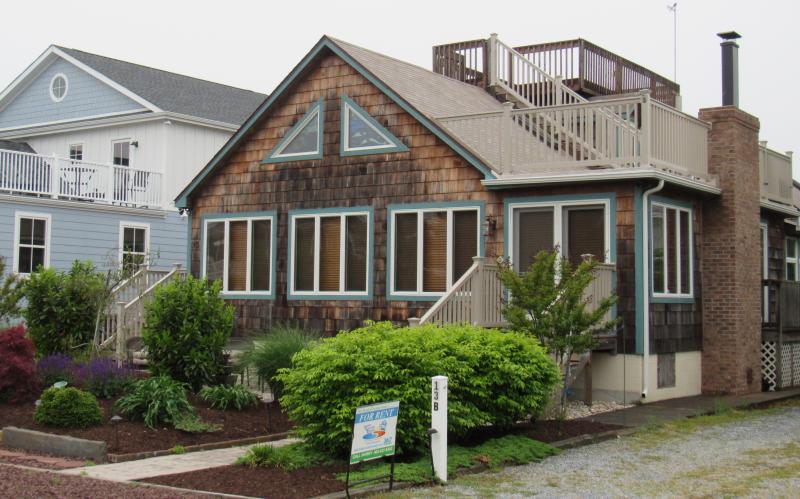Dewey Beach Town Council’s ongoing discussion of raising the accommodations tax continued at council’s May 12 meeting.
Commissioners began discussions April 14 on whether to increase the tax, and whether the tax should be specified in the town charter. At 3 percent, Dewey’s accommodations tax is the lowest among southern Delaware’s beach towns. Because it is specified in the town charter, the Legislature must approve any tax changes adopted by town officials.
Dewey Mayor T.J. Redefer suggested a possible referendum on the September 2018 general election ballot to consider an amendment to the town charter relating to the accommodations tax. He said raising the tax just 1 to 2 percent would contribute an additional $130,000 to $250,000 a year in revenue that could be specifically allocated to solving Dewey’s widespread flooding issues. Redefer said he is open to considering all funding possibilities, and that asking voters to decide is the town’s best path forward.
Commissioner Dale Cooke agreed.
“Delaware is going to be in trouble with flooding, and if everybody in this town knew how far the floods would come into this town eventually, some people might not be buying houses; some people might be selling,” Cooke said. “We have to raise some money so the town can come up with our share to cover the costs. We can’t continue to stick our heads in the sand.”
Redefer said, “If the 200 to 400 people who rent their homes on the black market were to come in and pay their business license fees and accommodations tax, we wouldn’t have to have this discussion at all,” referring to property owners who list and book their properties through online services such as Airbnb.
Redefer thanked the nearly 800 owners who pay the license and tax, contributing at least $500,000 to the town each year. Cooke recommended a town hall employee check online rental listings to ensure property owners are paying the license fee and tax.
“It’s not an ‘I gotcha;’ they got us already,” Cooke said. “They’re not following the law. We need to make everybody follow the same laws.”
Dewey property owner Jill Compello, who ran and lost in Dewey’s September 2017 municipal election, said hiring someone to check websites would be like looking for a needle in a haystack. She says flooding affects everyone in Dewey; she suggested a committee to research grants and other funding.
Marcia Schieck, who rents several homes in town, said the town does not have sufficient time to prepare and plan for a referendum in four months, and that the tax was put in the charter so it could not be changed by a council that changes every year.
“Rental property owners volunteered to implement this tax because the town needed money. We’ve already contributed $3 million to $4 million to this town’s budget, and we continue to do that,” Schieck said. “Previous administrations have had six to seven years to identify new sources of revenue, and they should have done that.”
Schieck said raising the tax will not work and called for council to find other sources of revenue.
“It’s not the direction to go. Do research and form a committee to see how businesses can contribute. You can’t just come back at us for a second stab at money,” Schieck said.
Commissioner Gary Persinger says the accommodations tax could be considered a visitors’ tax, but the town is only taxing certain visitors. He says commissioners are just beginning to scratch the surface to find strategies to fight sea level rise and other flooding issues.
“There’s not an urgent need right now to raise the accommodations tax, but there is an urgent need, I believe, to protect what we have,” he said. “We need a lot more public input on this issue.”
In November 2017, Rehoboth Beach commissioners unanimously approved doubling the city’s residential rental tax rate from 3 percent to 6 percent to fund capital improvements. The vote was also partially made in response to a proposed state law that would apply an 8 percent accommodations tax to residential rentals and not allow cities to raise rental taxes without state approval.
While the bill was being debated in the General Assembly in May 2017, Rep. Pete Schwartzkopf proposed allowing towns with rental taxes to keep their percentage while the state took the remainder.
Persinger added if state legislators extended the state lodging tax to residential rentals in addition to hotels and motels, it would wipe out Dewey’s accommodations tax revenue. He recommended changing the charter, which is state law, to delete the connection between the accommodations tax and exclude anyone subject to state lodging tax from paying Dewey’s local accommodations tax.
Redefer said he doesn’t want fear of a possible state law affecting council’s conversation on its accommodations tax.
“I have been talking to high-ranking state leaders and have been told it’s something we may worry about too much,” he said. “I’ve been assured by politicians that they would not take our 3 percent. It would be suicide for them to take the half-million dollars we need from that fund.”
Commissioner Paul Bauer suggested continuing conversations this summer and letting town voters decide the issue in September.
“By nature, I’m an anti-tax guy, and that’s probably what attracted me to Dewey Beach,” he said. “But the reality is, there are expenses, and they grow as more people are coming here. I think it should be the people’s vote, not the commissioners’ vote.”





















































